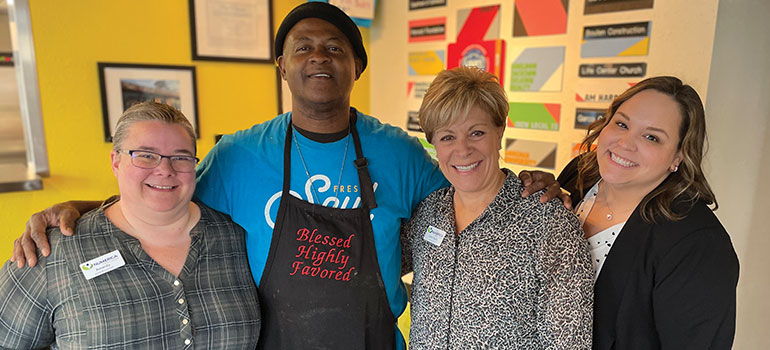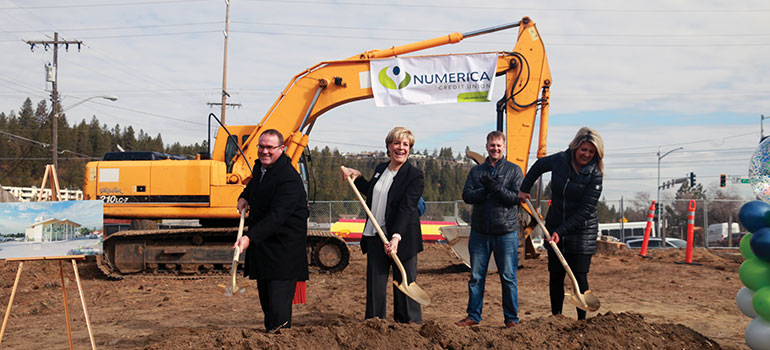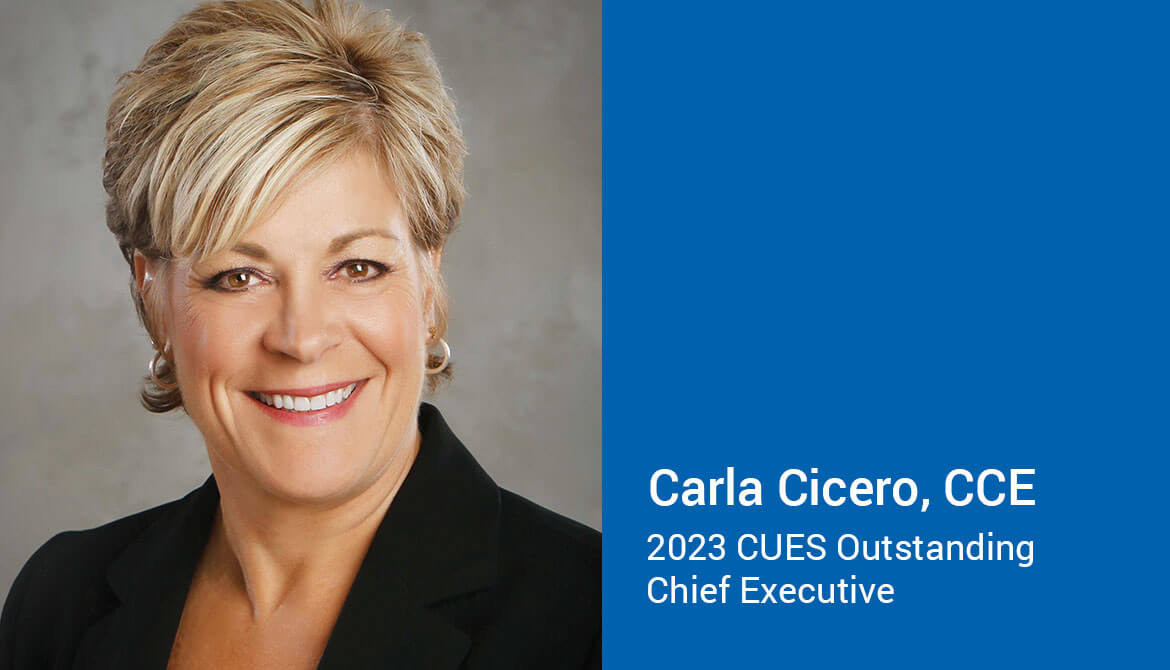13 minutes
2023 Outstanding Chief Executive Carla Cicero, CCE, is passionate about creating high-performing teams.
When Carla Cicero, CCE, was 22 years old, she set a goal to become a credit union CEO by the time she was 35. Achieving this goal might have seemed highly unlikely at the time. She had yet to earn a college degree and had only logged a few years working at credit unions. But just a decade later, not only did Cicero reach her goal—she achieved it three years ahead of schedule.
What she has done with the opportunity is more important than the timetable. Over the last three decades, Cicero, a CUES member, has proven herself to be one of the most capable, well-respected CEOs in the industry, making her an exceptionally worthy recipient of the 2023 CUES Outstanding Chief Executive award.

For the last 12 years, Cicero has served as president/CEO of $3.8 billion Numerica Credit Union, headquartered in the Spokane Valley area of Washington. Prior to taking the helm at Numerica CU, she spent 19 years in the top spot at CitizensFirst Credit Union (now known as Verve, a Credit Union) in Oshkosh, Wisconsin.
“My biggest accomplishment at both organizations was building a culture of people who are aligned with the core purpose or mission of the credit union,” Cicero reports. “Creating a high-performing culture supported by high-performing teams is something I’ve always been passionate about.”
The CUES award is the latest in a long list of honors that Cicero has received in recognition of her accomplishments. Among her many accolades, she also received YWCA Spokane’s 2019 Women of Achievement Award, she was named one of the 2022 Women of the Year by local newspaper The Spokesman-Review, and just last year, American Banker named her to its list of the 25 “Most Powerful Women in Credit Unions”.
Aligning Purpose With Culture
At Numerica CU, Cicero’s focus on culture was instrumental in driving the organization’s rapid growth. Since her arrival, the credit union has grown to nearly four times its 2011 asset size of $1 billion. Currently, the credit union serves 174,000 members with 21 branches throughout Washington state and northern Idaho.
The organization’s culture aligns with its core purpose of enhancing lives, fulfilling dreams and building communities. All 670 employees keep that purpose uppermost in their minds as they go about their daily work. “We talk about it every single day,” Cicero says. “It’s part of who we are. It’s an honor and privilege to be in an industry that can help people improve their lives and achieve their dreams. Financial security is foundational to happy lives. If we’re successful in helping people achieve it, we can build communities. As a CEO, I’m so gratified to see our employees have such a strong alignment of culture and purpose and doing everything they can to fulfill it.”
Board Chair Wes Mortensen admires Cicero’s ability to hire talented individuals devoted to living this mission. “She takes care of her team, listens to what they need and has made Numerica an award-winning Best Place to Work,” reports Mortensen, a CUES member. “Since Carla came to Numerica as CEO in 2011, Numerica’s team has doubled in size. And with her heart for serving the community, Numerica has given back more than $13 million to local causes.”
Central to the organization’s core purpose are five internal principles, which spell out the acronym CARES: Connect, Act, Resolve, Elevate and Strengthen. “Those are the principles that we measure each other by,” Cicero says. “We celebrate by selecting CARES champions. Every year, we get over 1,200 nominations from our employees who witness other employees doing extraordinary things that are consistent with our CARES principles. From those nominations, we select quarterly and annual winners.”
Recent CARES champions include an employee who supported a team member who was experiencing health issues; this champion brought meals to the family and created an internal communication chain to coordinate with other employees providing meals as well. Another CARES champion stopped to assist a cyclist who had been hit by a car; the cyclist was so grateful that they ended up becoming a member.
A CU Background
Born and raised in Los Angeles, Cicero’s ambition to excel in the credit union industry didn’t appear out of thin air. Her parents were CU members, and when she was just 17, fresh out of high school, she took a job working at a small credit union affiliated with her mother’s work. “It was a tiny, million-dollar-asset credit union called Superscope Employees’ Credit Union and had a staff of just two people,” she recalls.
By the time she was 22, Cicero was working at another credit union. “I thought, ‘If I’m going to make a career for myself, this is a great industry to be in.’”
That’s when she set her sights on reaching the top of the C-suite. She admits to being naïve about what that might entail, but she was fortunate to have mentors, including a long-time friend and her boss. “They talked to me a lot about what it takes and helped coach me to develop the leadership skills that I needed to be a CEO,” she says.
At age 27, Cicero took a substantial step toward her goal when she was hired as VP of credit at Rockwell Federal Credit Union (now Financial Partners Credit Union, fpcu.org) in Downey, California. She told the CEO that she aspired to become a CEO herself. “I knew I needed to go to school and get a degree, and he was good enough to agree to pay for my education,” she recalls.
By then, Cicero was the mother of two small children but was able to complete her degree by taking night classes—even though it meant fighting through L.A. traffic. She earned her bachelor’s degree in business administration from the University of Phoenix in 1991, and by the end of the year, she accepted the top spot at $90 million Wisconsin Axle Credit Union in Oshkosh.
“We changed the name to CitizensFirst shortly after I arrived,” Cicero says. “I was hired as CEO at the age of 32, three years ahead of my goal.”
With her children now in school, Cicero was happy to leave behind the hustle and bustle of Los Angeles for small-town life. “I loved every minute of the experience of moving my children to Wisconsin,” she recalls. “Being in a small community, we embraced that environment because it was such a great place to raise children.”
Cicero led CitizensFirst CU during a time of expansive growth, with the credit union nearly quadrupling its asset size to $350 million in less than 20 years. “But I knew I would want to move on before I retired to see what I could do at a larger credit union with greater resources,” she says.
In preparation for that next step, Cicero earned her MBA at the University of Wisconsin-Oshkosh. She intended to stay at CitizensFirst CU until her children and stepchildren were ready for college. When the financial crisis hit in 2008, she decided to stay longer until the economy stabilized so that she could leave CitizensFirst CU on firm footing. In 2011, she began her search and was delighted to be selected to lead Numerica Credit Union.
“The match has been very good,” Cicero says. “I’ve enjoyed working among so many talented people, just as I did at CitizensFirst.”

A Collaborative Approach
The staff at Numerica CU has similarly positive things to say about Cicero. Chief Administration Officer Kelley Ferguson, CCE, a CUES member who has been with the credit union 25 years, recalls how Cicero worked on shifting the culture immediately. “When Carla came to Numerica, she brought a style of leadership that we needed as an organization,” he says. “Her focus is on collaboration and compassion and leading in a way that lifts everybody up, allowing all voices in the room to be heard. She’s done a great job driving the organization in the right direction and helping us do some amazing things.”
Taking a collaborative approach has resulted in excellent results in the execution of the credit union’s plans and strategies. “We have multifunctional, multilevel project teams, in which people work together to create the best outcomes,” Cicero says. “These teams are led by our SVPs, who bring together all the people who need to have a voice at the table in moving a project forward.”
Such collaboration has been instrumental to the success of several major initiatives, including development of a new mobile app, a digital banking platform, a new phone system, and new loan origination and member origination processes. The collaborative approach underscores a major principle that Cicero espouses about leadership—that no single individual can create a successful organization on their own.
“There are many people involved in the success of what we do,” she says. “At Numerica, we believe in our people. All of our senior leaders—our HR department, our organizational development department, our culture team—are constantly looking out for what is best for our team members. We develop them to be the best they can be, professionally and personally. We have high expectations for their achievement and the great things we can accomplish together. I watch the people at Numerica do phenomenal things that are bigger and better than anything I could have ever imagined.”
Cicero has further fostered a sense of collaboration by being fully transparent with her team, even sharing some personal facts about herself. “I believe in being authentic about who I am,” she says. “So, I talk to people about my past. I talk about the fact that I’ve learned that I’m dyslexic and that has created a struggle in my entire working career. But now I have a name for it and understand it. Because I’m transparent, it encourages others to be transparent as well.”
Ferguson regards transparency as one of Cicero’s great leadership qualities. “She does a great job of connecting with people,” he observes. “She is unique in how she makes herself accessible to the whole organization: having coffee with new employees, doing town halls and fireside chats, and really being there for others—and not just herself but also ensuring that her C-team is there and available to talk to the organization too.”
In addition to personal transparency, Cicero believes it’s important to have transparency for the organization as whole. “Any employee can go online and see how we’re doing on our metrics, what our projects are and who’s involved,” she says. “We want people to have this knowledge because there’s power in that.”
Challenges as a CEO
Cicero concedes that unpredictable events, including financial crises, economic ups and downs, and even a global pandemic, have made being a CEO challenging these last few decades. However, her leadership skills include the ability to expect the unexpected and prepare accordingly.
“I think you have to be nimble, and you have to plan ahead,” Cicero says. “COVID was an interesting example of some of the work that we’ve done. Probably six years ago, the leadership team took on a project of identifying major threats—locally, nationally and internationally. … We dug deeply into threats that had the highest potential and impact, developing plans to deal with them.”
The team identified seven or eight of these high-impact events, one of which was a scenario for a fictitious pandemic called “the dog flu.” A few years later, the very real COVID-19 crisis hit, mirroring the circumstances of the fictional “dog flu” closely. As result, the organization was well prepared to put its pandemic plan into action, including rapidly transitioning to a work-from-home environment for employees and seamlessly shifting staff as needed to keep its branches open. Additionally, the credit union had implemented a video-based communication system a couple of years prior, which made it easy for members to interact with CU staff from the comfort of their homes.
“One of the strengths of our organization is that we’re always looking out into the environment to figure out what’s happening and how it could impact us,” Cicero says. “COVID is a great example of planning for what could possibly happen and having an organization nimble enough to respond.”

A Commitment to Serve
During her years as president/CEO, Cicero has racked up a long list of community and industry involvement. Among her industry activities, she served on the board of directors for the World Council of Credit Unions for six years. For her work with CUES, she was inducted in the CUES Hall of Fame. Locally, she is chair of the Greater Spokane Inc. Board of Trustees and serves on the boards of several other organizations, including Rosauers Supermarkets, the Association of Washington Businesses and the Coeur d’Alene Economic Development Corp.
“I view community involvement as part of my role in being a good corporate citizen,” Cicero says. “Our leaders need to invest in our communities with their time, talent and treasure, and at Numerica, we do all three. In addition to the millions we have given to local causes in the last 12 years, we have given thousands and thousands of hours of volunteer time from our employees. We pay our employees eight hours to volunteer in the community, and many of them go beyond that. It’s all part of our culture of giving and serving.”
Mortensen affirms that Cicero’s community involvement has been exceptional. “One thing that amazes me about Carla is her absolute commitment to giving back to our community,” he says. “This was one of the qualities that impressed our hiring committee at the time she was being interviewed, and Carla has made good on that early commitment. … I continue to marvel at the way she leads Numerica in this effort and inspires all of us to give more of ourselves than we otherwise may be inclined.”
On a personal note, Cicero is devoted to her family, which includes her husband, two daughters, two sons-in-law, three grandchildren, a stepdaughter and a stepfamily from a previous marriage. “Family is central to who I am,” Cicero says. “My husband, Mike, and I love spending time with our family and with our dogs too. We love to travel, we love to hike, we love to sail. We enjoy cross-country skiing and biking, and then when at home, I like to knit.”
Looking back at her decision to carve a career in the credit union industry, Cicero is pleased that she never deviated from her goal—even when other sectors of the financial services community came calling. While in Oshkosh, she had the opportunity to interview for a bank president position, but she turned it down without hesitation. She could not renege on her commitment to the credit union movement.
“I’m happy to be in an industry in which we think about our members first and then figure out how to make a profit from doing that,” she says. “That’s so important to who I am. I firmly believe it’s important to be focused on something bigger than yourself, as an individual and as an organization, and then having a culture that supports it.” cues icon
Based in Missouri, Diane Franklin is a longtime contributor to CU Management magazine.





